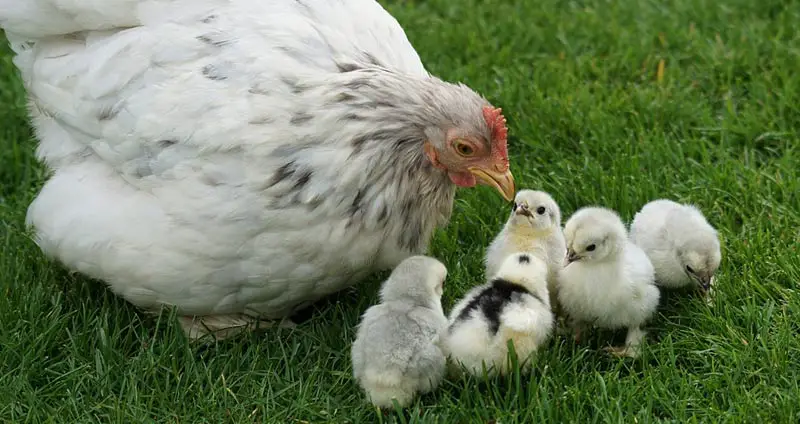If you own chickens, or any animal for that matter, you’ll definitely want to know how long you can expect them to live for. Not only will this help you prepare emotionally, but it’s also beneficial when working out finances and when determining how many eggs you’ll be able to get out of each chicken.
This post will go in-depth about the many different factors influencing a chicken’s lifespan and will give you a good expectation for how long your chickens will live for.
Table of Contents
How Long Do Chickens Live?
On average, a chicken’s lifespan tends to sit between 5 and 8 years. However, this isn’t a catch-all answer, as there’s many different factors that contribute to a chicken’s lifespan such as their breed, environment, and general care.
To begin with, that’s the lifespan for a typical backyard chicken — one that’s purposefully raised to an old age. Commercially-raised chickens aren’t so lucky. Laying hens are usually killed at around age 2 to 3 due to their decreased egg production, while broiler chickens are killed much younger at around 6 to 7 weeks old.
While the average age of a pet chicken is around 7 years old, that number can be drastically cut short or, in some cases, doubled. It entirely depends on the care that they’re given by their owner, and this “care” has quite a few different aspects to it.
How Long Can A Chicken Live?
This question can only be answered by looking at the age of chickens that have gotten to be extremely old. While it’s not impossible to see chickens living up to 10 years of age, there have been chickens that have blown that number out of the water. In fact, the oldest recorded chicken, Matilda, died at age 16!
It’s very clear that chickens that are kept as pets will almost certainly outlive wild or commercial chickens unless a freak accident happens. This discrepancy in age is attributed to a captive chicken’s steady food supply, safe environment, and overall stress-free life. All of the factors combined work to provide a chicken with a very long life.
It can’t be explicitly stated what exactly makes a chicken live to be twice its expected age. Any outliers in age are likely due to a combination of great care, exceptional genetics, and a good amount of luck. While the luck aspect can’t be controlled, proper care is certainly achievable.
Therefore, if you want your chicken to live as long as possible, there are several things that you can do to ensure a prosperous life.
How To Increase Your Chicken’s Lifespan
While it’s been established that there isn’t an exact science on how to get your chicken living past 10 years of age, it can be boiled down to two main ideas. Those ideas are great care and a healthy family history — both of which can be controlled in some way.
Good Genetics
To begin with, if you haven’t started your flock yet, it’s a great idea to purchase chickens that come from a line of other healthy chickens. When your chickens come from a line of genetically-strong chickens, the chances of them also being healthy is quite high.
You’ll typically want to look for chickens that come from an owner that’s kept really good care of their flock. They may note any health problems that have arisen in their chickens, giving you an idea of what to expect down the line.
Of course, this is out of scope for people that have already started a flock, but it’s something to consider.
Healthy Diet
Once you’ve acquired your chickens, the best thing that you can do for them is provide them with an optimal diet. It’s essential that you provide your chicken with a healthy diet that meets all of their nutritional needs and helps them grow strong. If a chicken has a nutrient deficiency, they’ll likely die long before they’re supposed to.
Chickens need to eat quite a few different foods, including a complete chicken feed, healthy scratch, fruits and vegetables, and other healthy foods that you may have laying around! Their diet should be structured to where you can change it up but still always provide the nutrients that they need.
Safe Environment
Your chicken’s environment is also something that needs to be considered. You’d be surprised with how well a clean and safe coop benefits your chickens. Get a coop that’s large enough to not feel cramped, make it comfortable inside with plenty of bedding, and keep things very clean.
If you have predators around your property, you’ll need to take some extra precautions. Consider adding very tall (6 feet) fencing around the space your chickens are kept in to keep them safe.
Also consider the temperature. Shade should always be available for chickens to get out of the harsh sun. Warmth should also be available when temperatures get extremely cold.
What Cuts A Chicken’s Lifespan Short?
While we’ve gone over things that you can do to increase your chicken’s lifespan, there are some things that work to decrease it. Many of these factors can be avoided, but they still prematurely claim the lives of thousands upon thousands of chickens annually.
Predators
It’s often stated that predators are the main cause of premature death in chickens. Unless you constantly keep your chickens contained with an extremely fortified run, there’s a good chance that you’ll lose a few members of your flock to hawks, dogs, or other hungry creatures.
If you can effectively keep predators away, then there’s a good chance that your chickens will live up to their expected lifespan.
Illness
Even if you take very good care of your chickens, it’s possible that they can become ill. By living out in the elements, chickens can be exposed to many different diseases, especially if they come in contact with other disease-carrying animals.
It’s definitely a good idea to practice good bio-security with your chickens. Provide them with preventative foods and medicines if you think that they’re susceptible to a certain illness. However, note that it’s impossible to fully protect them.
Improper Care
Of course, improper care will drastically decrease the lifespan of your chickens. Chickens that aren’t given complete diets, constant fresh water, safe environments, and good medical care will almost certainly not live as long as their well-cared-for counterparts.
Before getting chickens, make sure that you know how to best care for them so that you can provide them with the best care possible from day one.

